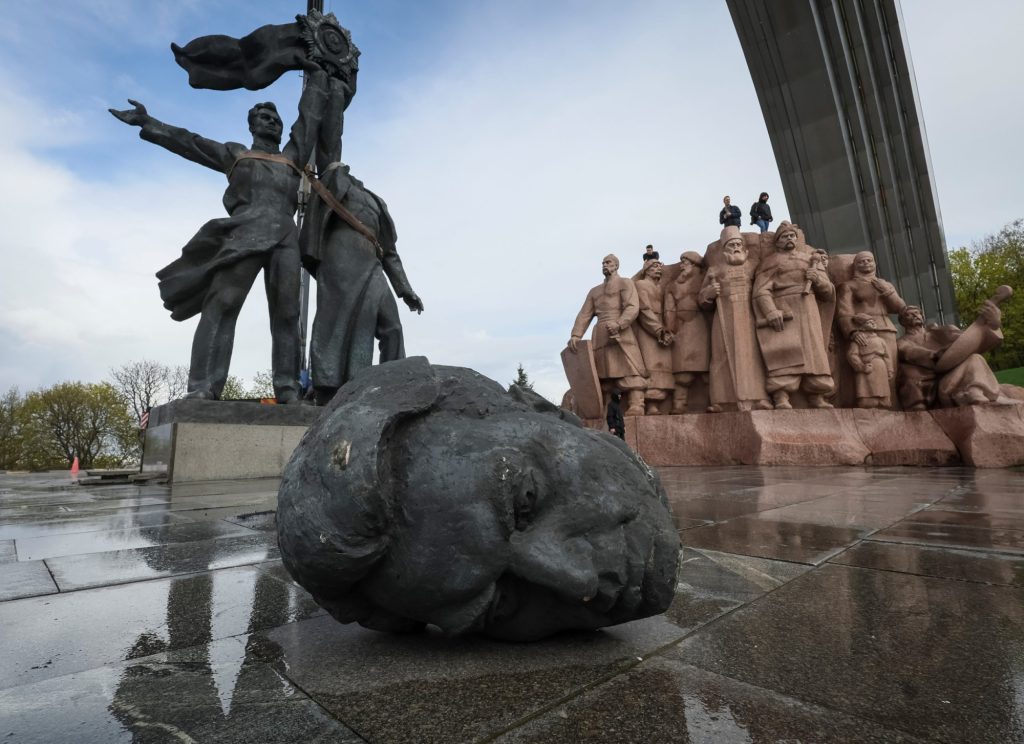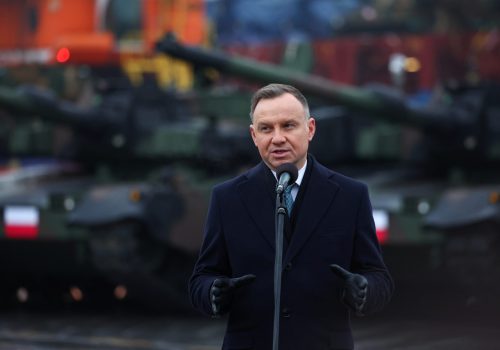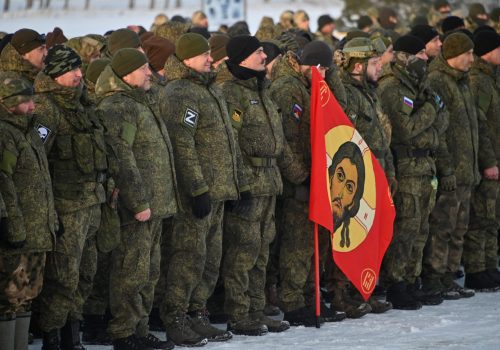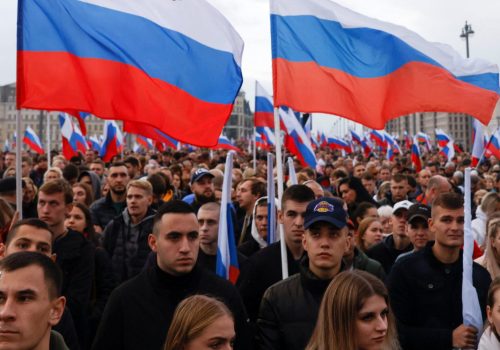As Russia’s invasion of Ukraine reaches the one-year mark, the war unleashed by Vladimir Putin in February 2022 is still far from over. Nevertheless, it is already abundantly clear that Ukraine’s relations with Russia have fundamentally changed forever. After Mariupol, Bucha, and countless other Russian war crimes, there can be no more talk of a return to an earlier era of close ties and blurred borders.
The troubled history of Russian-Ukrainian relations stretches back centuries. It a story of unequal interaction shaped by the politics of Russian imperialism. During the post-Soviet era, the bilateral relationship has been particularly turbulent as Russia has sought to retain its dominant position while preventing Ukraine from asserting its independence. Throughout this period, the Kremlin’s heavy-handed and tone-deaf policies have consistently proved counter-productive, serving only to widen the divide separating today’s Russia and Ukraine.
The first major watershed moment in this unfolding geopolitical divorce came in 2004 with Ukraine’s Orange Revolution, which saw mass protests over a rigged presidential vote leading to the subsequent election of pro-European candidate Viktor Yushchenko in a rerun ballot. Prior to the vote, Putin personally visited Ukraine to support pro-Kremlin candidate Viktor Yanukovych. This hubris backfired spectacularly and was widely regarded as a key motivating factor behind the huge street protests that erupted weeks later.
The Kremlin-controlled Russian media responded to the Orange Revolution with a coordinated anti-Ukrainian propaganda campaign that set the tone for many years to come. Yushchenko and his American wife, First Lady Kateryna, were vilified, while Ukraine itself was dismissed as an artificial country and Ukrainians dehumanized as “fascists.” Within months of Ukraine’s popular uprising, Moscow launched the Russia Today TV channel (now RT) to take the information war to international audiences.
A furious and humiliated Putin regarded the Orange Revolution as an act of aggression against Russia and accused Western governments of orchestrating the protests. This was to prove a major turning point in his reign. Prior to the Orange Revolution, Putin had frequently spoken of integrating Russia into the club of leading democracies. After 2004, he turned sharply away from the West and began to court a more traditional form of Russian nationalism. This included the championing of the Russian Orthodox Church and the rehabilitation of early twentieth century White Russian emigre imperialist ideologies.
While Putin’s Russia lurched back toward the authoritarian past, Ukraine continued to consolidate its fledgling democracy. The Orange Revolution had succeeded in ending government censorship over the Ukrainian media, meaning that there was no centrally orchestrated anti-Russian campaign in Ukraine to match the Kremlin’s own poisonous anti-Ukrainian propaganda. Instead, many of Ukraine’s most popular TV channels continued to broadcast Russian-made content and adopt Russia-friendly editorial positions. This reflected the prevailing mood within Ukrainian society, with attitudes toward Russia remaining broadly positive.
Stay updated
As the world watches the Russian invasion of Ukraine unfold, UkraineAlert delivers the best Atlantic Council expert insight and analysis on Ukraine twice a week directly to your inbox.
The second major watershed in the post-Soviet relationship between Russia and Ukraine was the 2014 Euromaidan Revolution. When Ukraine’s pro-Kremlin president, Viktor Yanukovych, fled the country following the mass killing of protesters, Putin chose to intervene directly by occupying Crimea and sparking a war in eastern Ukraine. Meanwhile, the Russian media escalated the information war against Ukraine, branding the revolution a “putsch” while portraying Ukrainians “Nazis” and puppets of the West with no real agency of their own.
The onset of Russian military aggression against Ukraine in 2014 had a profound impact on Ukrainian public opinion. As Russian troops flooded into Kremlin-created “separatist republics” in the east of the country, polls showed a surge in negative Ukrainian attitudes toward Russia’s political leaders. Similar trends were evident among Russian audiences, with Ukraine rising to second place behind America in polls identifying hostile nations.
During the eight years after the 2014 crisis, Ukraine and Russia moved further apart as the undeclared war between the two countries in eastern Ukraine rumbled on. In a bid to reduce the Kremlin’s ability to wage information warfare, Ukraine banned Russian social media, newspapers, TV channels, and Moscow-made television content. Meanwhile, affirmative action policies led to a rise in Ukrainian-language TV, cinema, and pop music, while many Russian cultural figures found they were no longer welcome in Ukraine.
Attitudes toward the shared part also diverged. While the Putin regime rehabilitated the Soviet era and glorified the Red Army role in World War II, decommunization legislation adopted by the Ukrainian authorities in 2015 outlawed Soviet symbols and led to a wave of name changes across the country as cities, towns, villages, and individual streets ditched Soviet-era names. Once seen by some as virtually indivisible, the two countries were now on strikingly different trajectories.
The spring 2019 election of Volodymyr Zelenskyy as Ukraine’s new president sparked fresh hope for a revival in Russian influence, but this was short-lived. As a native Russian-speaker who had spent much of his showbiz career in Moscow prior to entering politics, Zelenskyy was seen by many Russians as a potentially pliable partner. However, he proved just as principled as his predecessor, refusing to implement a Kremlin-friendly interpretation of the Minsk peace plan to end the simmering war in eastern Ukraine and shutting down a series of TV channels linked to Russia’s unofficial representative in Ukraine, Viktor Medvedchuk. Zelenskyy also sought to revive international interest in the Russian occupation of Crimea, launching the Crimean Platform initiative in summer 2021.
With Russia’s soft power influence inside Ukraine in apparently terminal decline, the confrontation entered a dangerous new phase which saw the Kremlin adopting an increasingly radical stance. Russian officials and propagandists began questioning the legitimacy of the Ukrainian state, which was branded as an unnatural “anti-Russia” that sought to divide the “Russian people” and could no longer be tolerated.
In July 2021, Putin himself took the highly unusual step of publishing a long, rambling personal essay entitled “On the Historical Unity of Russians and Ukrainians” that questioned Ukraine’s right to exist and was widely interpreted as a declaration of war against Ukrainian statehood. Seven months later, many of the core ideas from this essay would feature in a series of unhinged speeches that marked the launch of the current full-scale invasion. Earlier talk of brotherhood had given way to openly genocidal rhetoric.
Eurasia Center events

The brutality of Russia’s invasion has disproportionately affected the predominantly Russian-speaking populations of eastern and southern Ukraine, leading to an historic shift in attitudes toward Russia in what were previously the most pro-Russian regions of the country. Dozens of towns and cities in these regions have been reduced to rubble, with thousands of civilians killed and millions subjected to forced deportation. As a result, anti-Russian sentiments that were traditionally more prevalent in central and western Ukraine are now also widely embraced in the south and east. A recent poll conducted by the Rating Sociological Group found that 98% of Ukrainians believe the Russian military is guilty of war crimes, while 87% also hold Russian citizens accountable.
Ukrainians now overwhelmingly express negative attitudes toward the Russian population and have been horrified to witness the popularity of the war among ordinary Russians. They point to the consistently high levels of support identified by Russia’s most respected independent pollster, the Levada Center, and also note the almost complete absence of anti-war protests. Millions of Ukrainians with friends and family in Russia have learned from bitter personal experience that many Russians wholeheartedly back the war and refuse to acknowledge the atrocities taking place in Ukraine.
Amid the horrors of today’s full-scale war, the breakdown in relations between Russia and Ukraine has now reached the point of no return. Evidence of this historic shift can be seen throughout Ukrainian society. Large numbers of Ukrainians are switching their everyday language from Russian to Ukrainian. Derussification efforts have gained new grassroots momentum, with individual communities seeking to remove the last vestiges of the imperial past in both its Czarist and Soviet forms. Ukrainians are also deserting the Ukrainian branch of the Russian Orthodox Church in growing numbers and flocking to the independent Orthodox Church of Ukraine.
The current war has accelerated an ongoing deterioration in bilateral ties that has long reflected Russia’s misguided efforts to keep independent Ukraine in the Kremlin orbit. For decades, Russian leaders have been oblivious to the transformations taking place in post-Soviet Ukrainian society and have ignored Ukraine’s strengthening national identity. Their efforts to prevent Ukraine’s departure from the Russian sphere of influence have proved self-defeating and have resulted in deepening hostility along with a realization among Ukrainians that their country will never be truly free until it cuts all ties with Russia.
Many Russians remain in denial over the depth of the divide now separating them from their Ukrainian neighbors, preferring instead to blame everything on phantom fascists and meddling Westerners. This is wishful thinking. In reality, the two countries have never been further apart and the seeds of hatred sown by Putin’s invasion will continue to define the bilateral relationship long after Russia is defeated.
Taras Kuzio is a professor of political science at the National University of Kyiv Mohyla Academy and author of “Fascism and Genocide: Russa’s War Against Ukrainians” published by Columbia University Press.
Further reading
The views expressed in UkraineAlert are solely those of the authors and do not necessarily reflect the views of the Atlantic Council, its staff, or its supporters.

The Eurasia Center’s mission is to enhance transatlantic cooperation in promoting stability, democratic values and prosperity in Eurasia, from Eastern Europe and Turkey in the West to the Caucasus, Russia and Central Asia in the East.
Follow us on social media
and support our work
Image: A Soviet monument to friendship between Russia and Ukraine is seen during its demolition in central Kyiv. April 26, 2022. (REUTERS/Gleb Garanich)




